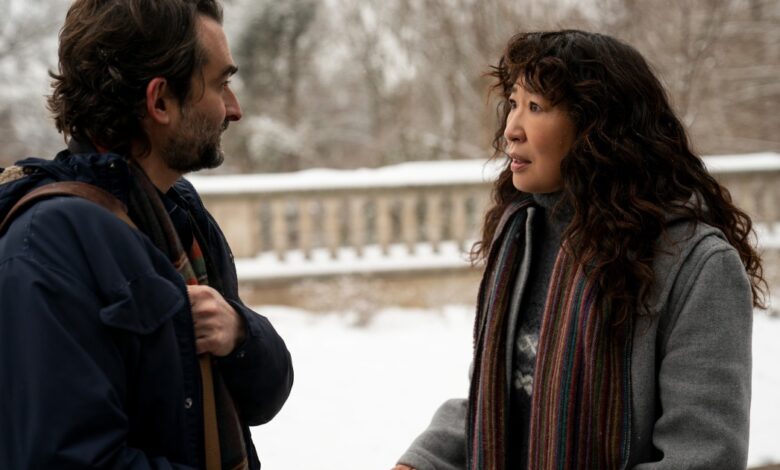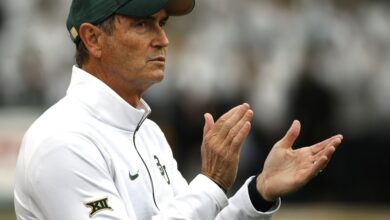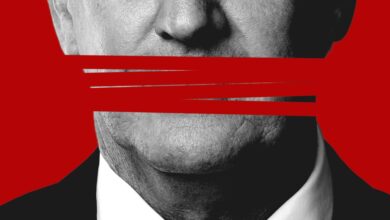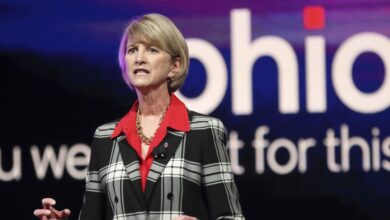A Chat With the Creator and a Star of Netflix’s ‘The Chair’

The central drama of The Chair, a new television series on Netflix about a new department chair at a liberal-arts college, is not uncommon to higher ed: A professor does something transgressive in the classroom. It blows up, narratives spiral, and students demand action.
Viewers also understand that the professor, Bill Dobson, played by Jay Duplass, is, to put it gently, a mess. His wife died a year ago, he’s got issues with alcohol and other substances, and his college-age daughter has just left home. He’s close friends — and maybe more — with his department chair, Ji-Yoon Kim, played by Sandra Oh. And he’s not one for bending to the administration’s agenda when the dean wants him to do nothing but apologize. All of this makes for bad optics and good drama.
The Chronicle spoke recently with Duplass, who is also a consultant on the show, and with Amanda Peet, a creator, writer, and executive producer of the series who set out to understand the pressures of being chair by interviewing academics in that position. This conversation has been edited for length and clarity.
I had a lot of moments watching the series when I thought, “Oh, I’ve written about that,” or, “We’ve covered that.” It seems clear to me that the show, while still being this romantic comedy/dramedy, is also a study of what academic-workplace dynamics can be like at certain prestigious, insular liberal-arts colleges. How important was it to you, Amanda, for that setting to feel real or true, in a sense? And how did you go about doing that?
Peet: It’s very important to me because obviously I’m not in the academy. As you pointed out, I wanted to take a stab at a workplace romantic comedy. I love the movies Tootsie and Broadcast News. I was thinking a lot about an English department as a place ripe for comedy, partly because of the intergenerational tension. You have these idealistic students, and then middle-aged folks whose idealism has been tempered, and then the old relics. I really wanted to set it in a place in which the vestiges of white male elitism are still at play, still hanging on.
Academia is perfect for that.
Peet: Well, obviously, some places are worse than others. I interviewed a lot of professors, and some of them would say, “That would never happen!” And some of them would give horror stories about how behind the times some of the people in their department were. The way I did it was I just interviewed a lot of people.
How did you find people? What did you ask them? What were those conversations like?
Peet: At first I was just doing friends of friends — I didn’t even care if that person was in an English department. I just wanted to find out what it was like to be a chairperson. It’s like that pie chart, that circle where it’s like, What You Know, What You Don’t Know, and What You Don’t Know You Don’t Know. So the more people I talked to, the more I realized what I didn’t know, and the more fascinating it got, and the more it seemed like, unanimously, professors felt that their department was a soap opera.
What was your perception of being a faculty member at a prestigious university before? How did it change through the process of writing and producing the show?
Peet: What struck me the most by the end of shooting is how much a lot of these people are in love with teaching, and see their students as real people from whom they can learn. That kind of, like, weary cynicism, I didn’t see that. I wanted to convey the passion that I heard in the voices of these professors I spoke to, and that they feel it’s a calling. That was very moving to me.
Jay, your character, Bill Dobson, is a bit of a mess. Ji-Yoon jokes in the show that he skirts very close to the “disaffected middle-aged white male professor” cliché, which is definitely a cliché I know. What got you interested in playing this character, and how did you go about preparing for that role?
Duplass: What got me interested in playing the character is the force of nature called Amanda Peet, whom I had the pleasure of working with on a TV show that my brother and I created called Togetherness. Honestly, I think all of this just evolved a bit from just our desire to collaborate. Me just being excited about Amanda as a writer and a creator. We were bandying about ideas for a while, maybe a couple of years. And then when she presented this particular idea, it was just 100 percent yes.
I didn’t go to an Ivy League school, but I went to a Jesuit Catholic prep school and was prepared for that sort of thing. I went to the University of Texas [at Austin], and I entered a super-cloistered program that was basically for Ivy League kids that either couldn’t afford Ivy League or didn’t want to go into debt or just wanted to go to a state school but still have that kind of education. And so, I don’t know, I felt comfortable in that world, but also I resent that world, and that world annoys me. The thing that I learned about myself when I first entered — I didn’t like it at all. I didn’t like academia. I didn’t like the swarming of ideas, which I had to live in for four years because I chose poorly. [Laughs.] But at the same time, I love, so much, their passion for what they were doing. It helped me figure out that I did want to be a filmmaker because I don’t like to overarticulate concepts. I like to just try to curate an experience for somebody else, I think is how I see it now.
It sounds as if you had a strong impression of academia before ever touching this project. Did your impression of being a faculty member, being in that workplace, change at all?
Duplass: I definitely thought a lot about how hard it is to be in academia. One of the things that I guess both Amanda and I enjoyed so much is just this idea that you had these very serious, overly educated, high-falutin’ individuals who are basically acting like they are — I don’t know — like on the set of Temptation Island. It’s an elimination scenario, and that’s real to life. So just compassion and sympathy and a little bit of empathy for them, because the film industry is certainly a dog-eat-dog world as well. But, yeah, I think a lot of love came through, and I definitely connected to what Amanda was saying in terms of, in the end, these people, they can’t not teach. That’s their affliction. If they’re still there after all these years, it’s probably because they love it. It made me have a lot of compassion for a lot of my professors in college and in high school, too.
There’s this narrative out there that college students are entitled or too sensitive or reactionary. In the series, when Bill does something controversial in the classroom, you see this range of student reactions. Some students write him off. Some want to hear him out. Some want him to apologize. I was curious, Amanda, what you wanted to communicate about college students today?
Peet: I wanted it to not be uniformly one thing. I wasn’t interested in a mob of snowflakes. I feel like that’s a disservice and that’s unfair and also boring because it’s a trope. And I also think that, for better or worse, however they express it, their attempt to correct this historical imbalance, the fact that some of these institutions have favored rich white people for so long, I think that it’s important to remember that that’s where they’re coming from.
You went to Columbia University for undergrad. Did you pull anything from that experience?
Peet: You know, I felt like an impostor there. I just felt somehow outside of it and felt that it was quite intimidating and that the core curriculum was quite intimidating. I was there right in the ’90s, right when all the core-curriculum wars were happening on campus at Columbia. The first day there, the students had hung a poster, a flag, over a library, where all the great white dead male authors were and superimposed, you know, Sappho and Woolf. But I was kind of out to lunch. It was not a time when I was really ignited by these things.
Students and sometimes younger faculty members agitate for change within these very staid institutions. That really came through — especially how the final episode ends. It’s a hopeful note for Ji-Yoon’s personal life, but in her professional life, you see her get chewed up and then spat out by the system. Was that the message that you hoped that viewers would get from that ending? Do you think that speaks to anything broader in academia, or is that more of a specific character choice there?
Peet: What I wanted is to put the audience in a position where they could really identify with someone who’s in a terrible dilemma. I wanted it to be really, really difficult for Ji-Yoon to condemn Bill and really, really difficult for Ji-Yoon to defend him, and just keep turning up the pressure against her from both sides. I still think for women in supervising roles in some institutions, you don’t only have to do your job. You also have to navigate everybody’s feelings about the fact that you’re the first woman, first female person of color, to head the whatever it is. That sort of extracurricular emotional work that women have to do to babysit their colleagues’ feelings about that is something I was really interested in exploring, the pressure when you’re the first one and the only one.
Source link






